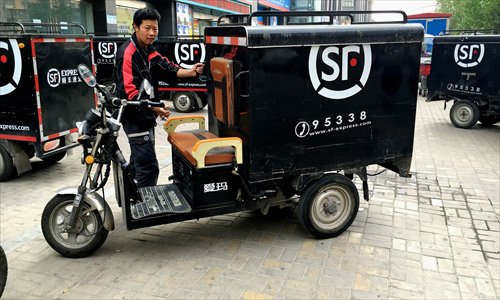HOME >> CHINA
Deliver dignity
By Ding Xuezhen Source:Global Times Published: 2016-4-19 19:48:01
Courier firm calls for people to respect employees after video of beating goes viral

A courier from SF Express delivers packages in Luoyang, Central China's Henan Province on Thursday. Photo: IC
China's delivery industry has recently drawn wide attention not for its rapid expansion amid downward economic pressures, but a young courier's pain and misery that aroused sympathy in all circles of Chinese society.
On Sunday, a video that showed a driver beating a courier from Hebei Province in a Beijing residential community, went viral, angering Web users and triggering debates about the treatment of service sector workers.
In the video, a middle-aged man gets upset with an employee of SF Express, China's largest delivery company by volume, after his car and the courier's three-wheeled electric vehicle scrape against each other. The driver repeatedly slaps the young man in the face, even though the deliveryman doesn't respond physically.
The courier told China Central Television on Monday that he apologized to the driver and compensated him with 400 yuan ($62) on the spot because he worried that he would deliver his packages late if he stopped to argue.
The outraged Net users later used a "human flesh" search to expose online the violent driver's personal information, including his name, home address and phone number.
Beijing police announced Monday on its official Sina Weibo account that the driver has been given 10 days in detention for picking a quarrel and provoking troubles.
Demand respect
Wang Wei, chairman of SF Express, wrote later on Sunday evening on WeChat that he "would not deserve to be chairman if he simply let the incident pass without comment," news site thepaper.cn reported.
On Monday, the company made an official statement on its Weibo, saying it will not accept a mediation request considering the seriousness of such bad behavior.
Calling for the public to respect employees in service industries, the statement has received a total of 194,000 likes and some 60,000 reposts as of press time.
Founded in 1993, SF Express had nearly 340,000 employees by the end of July 2015 and is reportedly preparing for an initial public offering in the stock market.
According to statistics from China's State Post Bureau, the country's courier industry entered a rapid , ongoing development period in 2011 when its annual growth rate first surpassed 30 percent a year.
In 2015, the industry delivered a total of 20.67 billion packages across the country, a year-on-year increase of 48 percent, and its income grew by 35.4 percent to 276.96 billion yuan. In Beijing alone, a revenue of some 18 billion yuan was generated by the industry in 2015.
However, people's respect for couriers failed to keep pace with the industry's rapid expansion.
Outsiders
SF Express set a good example of safeguarding the rights and dignity of its employees, when "there is still severe discrimination in China upon some common occupations like delivery couriers," Zhu Lijia, a public management professor at the Chinese Academy of Governance, told the Global Times on Monday.
"Such discrimination is partly caused by the lack of awareness of equality among different occupations," Zhu said, citing the fact that government officials have more "political and moral advantages" than couriers.
With economic progress, "the inequality of income and wealth distribution" will contribute to the tendency to evaluate one's achievements based on wealth, said Wang Zhenyu, deputy director of the public decision-making research center at the China University of Political Science and Law.
Although a courier can easily earn over 10,000 yuan in months like November when there are online shopping holidays, he or she has to start work as early as 6 am and head home at 11 pm during those days, the Beijing Youth Daily reported in 2014.
Previous reports showed that most people doing such low-skill jobs are migrant workers, who are not "accepted" by some locals, expert said.
"They look down upon you as they think you just came to seek a living here at the bottom of society," Wang said, underscoring that " social stratification and the household registration system both helped cut apart society."
Wang warned that the lack of mutual understanding and respect between different social strata may lead to people becoming isolated from their local communities and infringing on each other's rights.
Posted in: Society